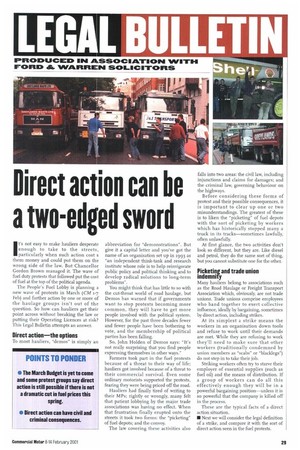Direct action can be a two-edged sword
Page 31

If you've noticed an error in this article please click here to report it so we can fix it.
It's not easy to make hauliers desperate enough to take to the streets, particularly when such action cost s them money and could put them on the wrong side of the law. But Chancellor Gordon Brown managed it. The wave of fuel duty protests that followed put the cost of fuel at the top of the political agenda.
The People's Fuel Lobby is planning a new wave of protests in March (CM 1-7 Feb) and further action by one or more of the haulage groups isn't out of the question. So how can hauliers get their point across without breaking the law or putting their Operating Licences at risk? This Legal Bulletin attempts an answer. abbreviation for "demonstrations". But give it a capital letter and you've got the name of an organisation set up in 1993 as "an independent think-tank and research institute whose role is to help reinvigorate public policy and political thinking and to develop radical solutions to long-term problems".
You might think that has little to so with the cut-throat world of road haulage, but Demos has warned that if governments want to stop protests becoming more common, they will have to get more people involved with the political system. However, for the past three decades fewer and fewer people have been bothering to vote, and the membership of political parties has been falling.
So, John Holden of Demos says: "It's not really surprising that you find people expressing themselves in other ways."
Farmers took part in the fuel protests because of a threat to their way of life; hauliers got involved because of a threat to their commercial survival. Even some ordinary motorists supported the protests, fearing they were being priced off the road.
_Hauliers had finally tired of writing to their MPs; rightly or wrongly, many felt that patient lobbying by the major trade associations was having no effect. When that frustration finally erupted onto the streets it took two forms: the "picketing" of fuel depots; and the convoy.
The law covering these activities also falls into two areas: the civil law, including injunctions and claims for damages; and the criminal law, governing behaviour on the highways.
Before considering these forms of protest and their possible consequences, it is important to clear up one or two misunderstandings. The greatest of these is to liken the "picketing" of fuel depots with the sort of picketing by workers which has historically stopped many a truck in its tracks—sometimes lawfully, often unlawfully.
At first glance, the two activities don't look so different, but they are. Like diesel and petrol, they do the same sort of thing, but you cannot substitute one for the other.
Picketing and trade union indemnity Many hauliers belong to associations such as the Road Haulage or Freight Transport Association which, obviously, are not trade unions. Trade unions comprise employees who band together to exert collective influence, ideally by bargaining, sometimes by direct action, including strikes.
At its simplest a strike means the workers in an organisation down tools and refuse to work until their demands are met. While they are refusing to work they'll need to make sure that other workers (traditionally condemned by union members as "scabs" or "blacklegs") do not step in to take their job.
Striking workers often try to starve their employer of essential supplies (such as fuel oil) and the means of distribution. If a group of workers can do all this effectively enough they will be in a powerful bargaining position—unless it is so powerful that the company is killed off in the process.
These are the typical facts of a direct action situation.
• Next we will consider the legal definition of a strike, and compare it with the sort of direct action seen in the fuel protests.
































































































